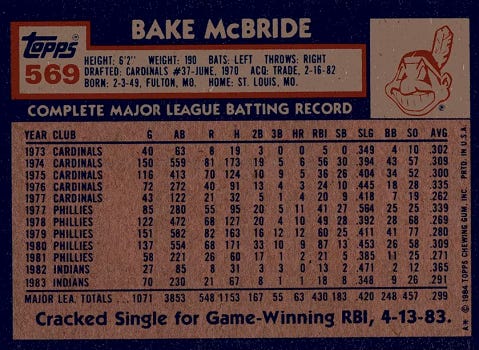1984 Topps Bake McBride (#569) - Card of the Day
How does a guy go from being a 37th-round pick in 1970 to making his big league debut in 1973? There are undoubtedly multiple approaches that would get the job done, but for Bake McBride, the recipe called for:
hitting .300 or better just about everywhere he went
double-digit home run power
40-steal speed
a dash of above-average plate discipline
a pinch of Gold Glove potential in centerfield
The finished product popped out of the St. Louis oven in late July 1973 — in 40 games down the stretch for the Cardinals, McBride hit .302, serving notice that he just might stick.
And stick, he did, taking over centerfield from Jose Cruz and winning the National League Rookie of the Year Award with a pretty nifty batting line that included a .309 average, 6 home runs, 56 RBI, and 30 SB.
(Cruz would hit those same types of numbers for the Astros in short order.)
Paired with right fielder Reggie Smith and left fielder Lou Brock — who spent the summer breaking Ty Cobb’s single-season stolen base mark — McBride gave St. Louis an All-Star-caliber outfield with three potential MVP candidates in any given year.
McBride hit an even .300 in 1975 and then amped it up to .335, though in just 72 games thanks to shoulder and knee injuries, during the Bicentennial season of 1976. That performance earned him his first (and only) All-Star selection.
But after a slow start in 1977, McBride was gone, traded along with Steve Waterbury to the Phillies for Rick Bosetti, Dane Iorg, and Tom Underwood. McBride’s bat found new life in Philly, where he hit .339 with 11 dingers and 41 RBI in 85 games, helping the Phillies win their second division title.
The Phils repeated in 1978, slid back to fourth in the National League East in 1979, and then won the franchise’s first World Series title in 1980. McBride was there all along the way, though he slid to right field to clear center all-world glovemanGarry Maddox.
After another playoff appearance after the strike-torn 1981 season, the Phillies shipped McBride to Cleveland in exchange for reliever Sid Monge. By then, the injuries were starting to pile up, and McBridemakde just 27 appearances for the Indians in 1982 (though he did hit .365).
McBride made it into 70 games for Tribe at age 34 in 1983, but only 47 in the field. The rest of his at-bats were split between pinch hitting and DH’ing, with an overall line of .291, a single home run, 18 RBI, and eight stolen bases. That performance amounted to an 81 OPS+ (which obviously wasn’t a direct consideration back then).
That winter, as an aging hitter with declining utility in the field, McBride found no takers in free agency. Even so, since he hadn’t officially retired and had a successful big league track record, both Fleer and Topps issued career-capper McBride cards in 1984.
The latter (above) shows the left-handed hitter in the cage for the Indians, practicing his craft. Making it to that card — or even to the majors — was no mean feat for a late-round pick, as evidenced by the fact that Bake was the only member of his draft class to make the show.
And if you’re wondering where the “Bake” nickname came from in the first place, it runs in the family. McBride’s father, Arnold, who once pitched for the Kansas City Monarchs in the Negro Leagues also used the moniker…though the younger isn’t sure why or where the elder picked up that tag.
As for the Bake McBride who delighted fans in St. Louis, Philadelphia, and (occasionally) Cleveland, he turns 76 years old today.
Better Call Sid
While McBride was trying to get something together in Cleveland, Monge was at the head of a remarkable baseball journey…one that would see him pitch for three playoff-bound teams in two seasons, yet not see October action for any of them.
Read all about it right here!
Hall of Fame Birthday?
There’s at least one more baseball birthday that merits mention today — Fred Lynn is turning 73!
I won’t say Lynn deserves to be in the Hall of Fame, but I will say he had a better career than some guys already enshrined and was definitely among the best players in the game for the first several years of his career. And yet, he lasted only two years on the HOF ballot!
Whether or not Lynn ever gets another look at enshrinement, he definitely has plenty of classic cards worth another peak now and then. I’ve written about several of them right here.








Phillies don’t win in 1980 without Bake
His hr in game 1 was key
When my cousin gave me all his 70s cards, I had a bunch of Bake. Never knew he won ROY!